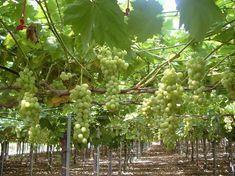
Asda has had a good year on grapes, according to fruit buyer Lee Harper, with a number of changes bringing added activity and growth to a popular sector.
“The last 12 months have been very good,” says Harper. “We’ve introduced more SKU’s to give our customers more choice in the category.”
The expansion in the range has seen the introduction of punnets, a move away from Asda’s traditional heartland of loose-bagged grapes, and the introduction of Smart Price, an own-label economy range.
“Smart Price is fantastic, as it means we can use more class II fruit, and that is working extremely well. Customers are reacting really well to it and we’ve seen growth in the category that we wouldn’t necessarily have seen.”
Harper says Asda was one of the first retailers to introduce the concept of zip-lock bags to the grape category, and when it comes to packaging, it is not resting on its laurels either.
“We’re still looking at the design of our packaging and particularly the colours. We want to make it more Asda-fied, make it something that shouts out quality and value. We’re developing that now.”
Asda is also tweaking its punnet offer, he says: “We’ve looked at clam-shell types and flow-wrapped packages - we’re always looking for the best way to get prices down for our customers.”
While loose, bagged fruit remains the more popular choice among consumers, punnets are making headway in the category, says Harper: “The advantage with punnets is that you’re telling the customer exactly what they’ll pay at the till. With the bags, they don’t know the actual value, but punnets give them that satisfaction, and we’re giving them the opportunity to make that choice.”
He says the punnets also have the advantage of hygiene, with customers considering the bagged fruit less hygienic as the produce is more likely to have been handled by other customers in the store.
“Punnets are more expensive, however,” he admits, “but we’re trying to do as much as possible to get the prices down. We’re doing a lot of things like packing at source, because you add a great deal of cost to the product if you pack in the UK.”
Of course, sometimes packing in the UK is unavoidable if you are experiencing quality problems, and Harper admits Asda has had some issues with its US grapes this season.
“It’s been really difficult with the US supplies this year, regarding quality of the fruit. And that has left us very short - it’s been the most difficult time we’ve had this year.”
The situation is a repeat of last year, he says, when US crop failed to live up to expectations, with the life of the produce being poor and the quality not holding in the store. “We had high levels of wastage and we’ve just had to try and minimise it. The problem occurs when Greece finishes early and we have to go to the US - it’s something we’re going to have to look into for next year. We’re hoping we’ll be able to stock 100 per cent Brazilian next season, and that will take away the problem.”
The problems in the US make packing at source impossible, however, as Asda is determined to ensure the quality of the produce getting through to the consumer. “You just have to do the work in the UK,” says Harper.
When it comes to promotion, Asda is well known for its low-pricing philosophy and, while there are no plans to deviate from that platform, Harper says they may be considering some extra tactics on top for next year.
“Every-day-low-prices (EDLP) is the way we promote - we aim to ensure the product is the cheapest it can possibly be and we will not be beaten on price by any other retailer.
“However, we may be doing some promotion next year. It’s not something I can talk about just yet, but we think it’s going to be an interesting year on grapes.”
When it comes to introducing new varieties, Asda is not going to be left behind either, says Harper, and the retailer works closely with growers, both directly and through its import arm International Produce.
A new development has been the addition of a new line to the grape range. “We’ve developed a new pack,” says Harper. “Best in Season. It’s not an Extra Special or Finest product, it’s simply what we feel is the best in season at that particular time of year. We did it this year, and it was a great success. We will use it to put new varieties in there and it works well. We’re working on a programme for next year now.
“We’re focusing on the eating quality of the fruit for that line - we won’t be using the mainstream varieties, Thompson or Crimson. While they may be excellent, we’ll be looking for things that are a little bit different.”
All of these developments, Harper hopes, will put Asda ahead of its field of competitors. “We’ve extended the range and choice for customers this year. If we want to compete we’ve got to deliver that choice, and we’re looking to improve on that again next year.”



